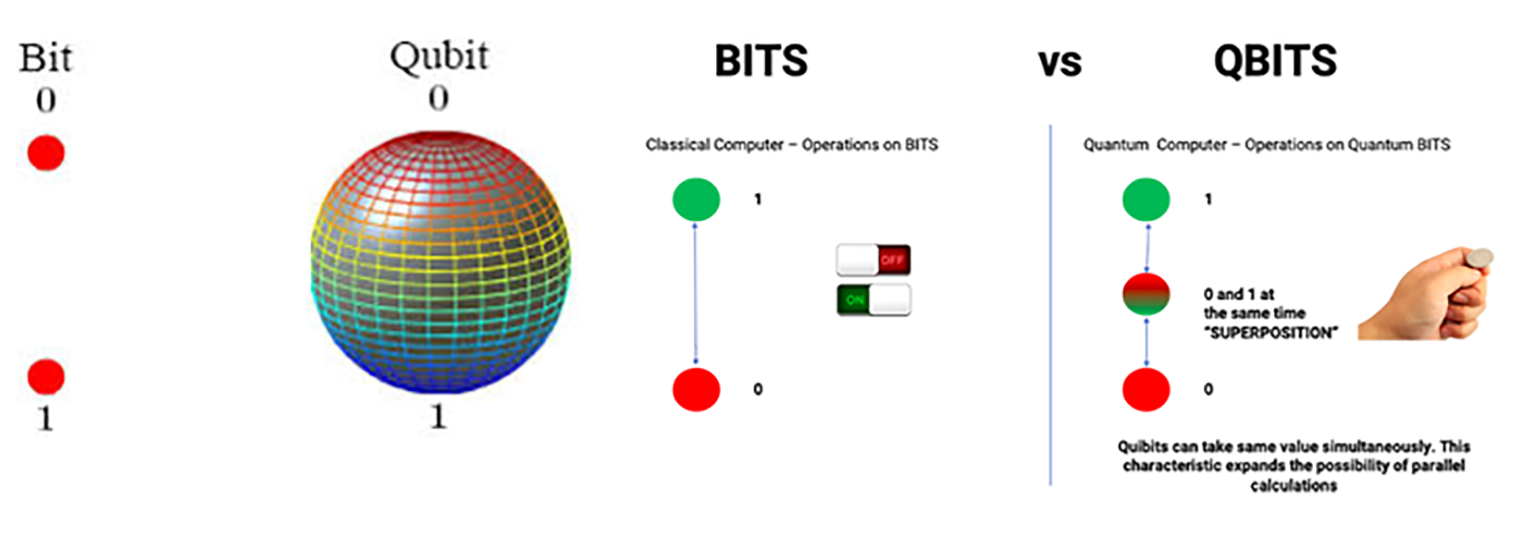-
28 Jul 2022
GS Paper 3
Science & Technology
Day 18: How is Quantum Computing different from Conventional Computing? Discuss the applicability and challenges of Quantum Computing. (250 words)
- Define quantum computing and mention its properties.
- Distinguish between quantum computing and conventional computing.
- Discuss the applicability and challenges of quantum computing.
- Conclude by suggesting some measures for proper use of quantum computing.
Answer
Quantum computing is a rapidly emerging technology that harnesses the laws of quantum mechanics to solve problems too complex for classical computers.
Properties of Quantum Computing
The basic properties of quantum computing are superposition, entanglement, and interference.
- Superposition: It is the ability of a quantum system to be in multiple states simultaneously. The example of superposition is the flip of a coin, which consistently lands as heads or tails—a very binary concept. However, when that coin is in mid-air, it is both heads and tails and until it lands, heads and tails simultaneously. Before measurement, the electron exists in quantum superposition.
- Entanglement: It means the two members of a pair (Qubits) exist in a single quantum state. Changing the state of one of the qubits will instantaneously change the state of the other one in a predictable way. This happens even if they are separated by very long distances. Einstein called spooky ‘action at a distance’.
- Interference: Quantum interference states that elementary particles (Qubits) can not only be in more than one place at any given time (through superposition), but that an individual particle, such as a photon (light particles) can cross its own trajectory and interfere with the direction of its path.
Quantum Computing Conventional Computing Quantum computers are the fifth generation of computers. The fourth generation of computers are used. In quantum computing, the phenomenon of quantum mechanisms such as entanglement and superposition are used, which say that there can be more than one state at the same time. In this computing, the classical phenomenon of the electric circuit is used. According to this phenomenon, there is only one state at a time which is either ON or OFF. With the help of qubit or Quantum bit, information storage and manipulation are done in quantum computers. With the help of bit 0 or 1, the information storage and manipulation are done in conventional. The basic building blocks are described by the quantum transistors or SQUID, or Superconducting quantum interference device. The basic building blocks are described by the CMOS transistors. The quantum computers are many times faster as compared to conventional computers as well as supercomputers. Conventional computers are slower than quantum computers. Quantum computing is used in big data analysis and simulations. Conventional computers store information inside memory and apply algorithms, computation and formulas to that information to produce results based on the requirements. Applications of Quantum Technology
- Secure Communication: China recently demonstrated secure quantum communication links between terrestrial stations and satellites. This area is significant to satellites, military and cyber security among others as it promises unimaginably fast computing and safe, unhackable satellite communication to its users.
- Research: It can help in solving some of the fundamental questions in physics related to gravity, black hole etc. Similarly, the quantum initiative could give a big boost to the Genome India project, a collaborative effort of 20 institutions to enable new efficiencies in life sciences, agriculture and medicine.
- Disaster Management: Tsunamis, drought, earthquakes and floods may become more predictable with quantum applications. The collection of data regarding climate change can be streamlined in a better way through quantum technology.
- Pharmaceutical: Quantum computing could reduce the time frame of the discovery of new molecules and related processes to a few days from the present 10-year slog that scientists put in.
- Augmenting Industrial revolution 4.0: Quantum computing is an integral part of Industrial revolution 4.0. Success in it will help in Strategic initiatives aimed at leveraging other Industrial revolution 4.0 technologies like the Internet-of-Things, machine learning, robotics, and artificial intelligence across sectors will further help in laying the foundation of the Knowledge economy.
Challenges Associated with Quantum Computing
- The dark side of quantum computing is the disruptive effect that it can have on cryptographic encryption, which secures communications and computers.
- It might pose a challenge for the government also because if this technology goes into the wrong hands, all the government’s official and confidential data will be at a risk of being hacked and misused.
Long after the birth of social media and artificial intelligence, there are now demands to regulate them. It would be prudent to develop a regulatory framework for quantum computing before it becomes widely available. It will be better to regulate it or define the limits of its legitimate use, nationally and internationally, before the problem gets out of hand like nuclear technology.





